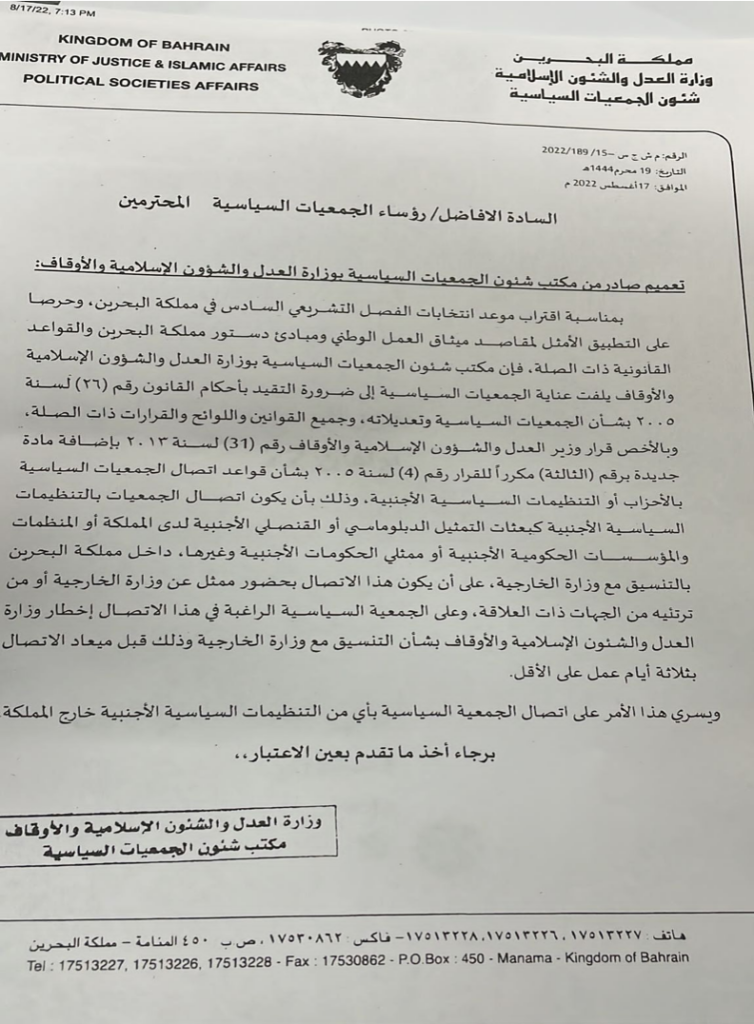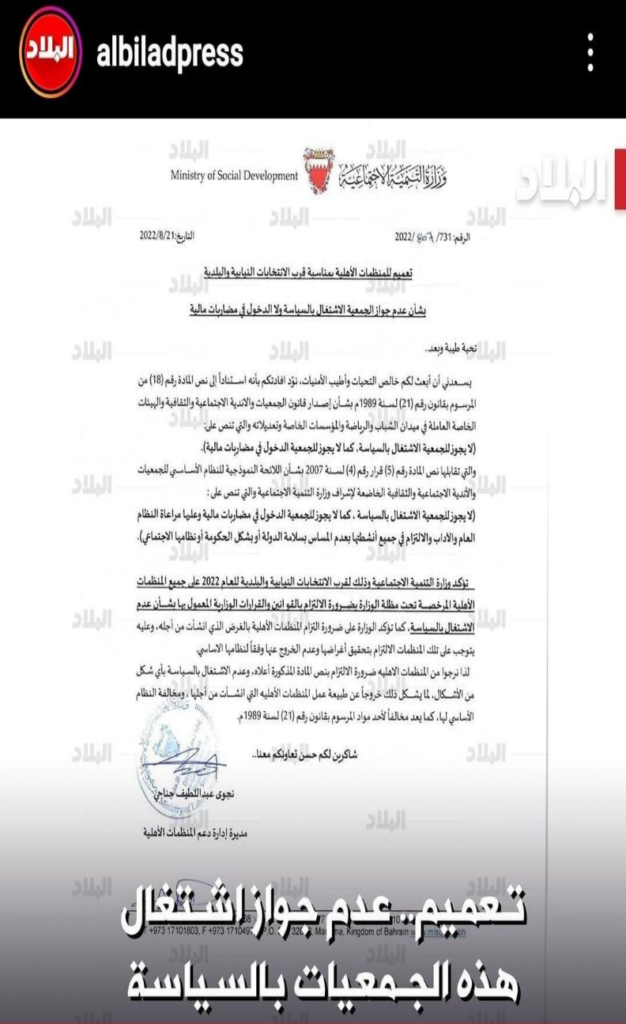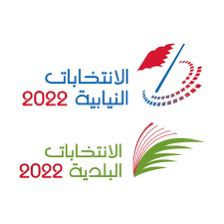Bahrain Election Briefing and Recommendations: September 2022
Bahrain’s Mute Election
Closed Civil Spaces Allow No Dissent and Parody Democracy
This briefing is the first part of a series of reports analysing the state of civil society, human rights, and the rule of law in Bahrain, in preparation for parliamentary and municipal elections being held there in November 2022. They measure the fairness and transparency of previous elections in Bahrain and contextualise relevant social, political and economics factors for the upcoming one.
In response to official queries, the Government of Bahrain (GoB) has released two statements reaffirming restrictions on civil society in the context of the upcoming parliamentary and municipal elections. On 17 August 2022, the Ministry of Justice, Islamic Affairs and Endowments released a circular letter to Bahrainis, reminding them that contact between with foreign organisations without the supervisor of the Ministry is prohibited. On 21 August 2022, the Ministry of Social Development released a circular statement reminding Bahrain-based NGOs that they must abide by Articles No. (18) of Decree-Law No. (21) of 1989 and No. (5) decision No. (4) of 2007, which stipulate that Bahraini associations may not engage in politics, and societies may not engage in financial speculation. They are legally obliged to observe “public order, morals, and commitment in all its activities not to prejudice the integrity of the state, the form of government, or its social system”.


The legislation effectively gags NGOs when it comes to discussing the upcoming elections or their most pressing issues to the Bahraini electorate: concerns over the state of the economy, sectarianism, and discrimination against Shi’a in Bahraini institutions. Moreover, it reduces domestic NGOs to ornamental bodies, largely incapable of affecting institutional change because they are unable to mention publicly relevant issues in the county, or even critique the GoB on policy.
The development is yet another barrier to government accountability, the GoB having banned political opposition and independent media in 2016 and 2017 and instituting a prohibition on leaders and members of dissolved political societies from running for boards of directors of charitable societies, civil organizations, and sports clubs in 2018.
During the 2018 parliamentary elections, the Council of Deputies systematically excluded political figures from formerly prominent political societies, such as Al-Wefaq and Wa’ad. Those deprived of the right to vote and to run for office were not only leaders and members of dissolved political societies, but also unaligned politicians with sympathies for the opposition, as well as human rights defenders, who were not affiliated with any political association.
Several applications made for running in the 2018 elections were rejected based on this legislation. Although most of the opposition boycotted the election, those who applied for candidacy were either rejected because of their previous affiliation with dissolved political societies or we believed to political sympathies towards them.
In 2017, the Exercise of Political Representation Law removed the right of association for swathes of activists. In January 2020, two members of the Bahrain Women’s Union board of directors were excluded because of their political affiliations, and in January 2022, the Ministry of Labour excluded 3 members of the Bahrain Human Rights Society from the right to run for the board of director’s elections because they were members of Wa’ad.
Perhaps most egregiously, in December 2021, the Ministry of Labour rejected 30 people out of 34 nominations for Charitable Society of Bilad al-Qadim’s board of directors because of their affiliation with dissolved political societies. This forced the election to be postponed, reducing the entire affair to a farce.
In light of these developments, Bahrain’s banned opposition have announced they are boycotting the 2022 elections, accusing the GoB of closing any civil spaces that would allow it to be challenged, or even criticised. This policy of suppression reflects a continuing trend, where the GoB has shown a fundamental lack of willingness to address the socio-political conflict between the government, human rights activists, and marginalised groups.
Despite having ascended to and ratified the International Covenant on Civil and Political Rights (ICCPR), which enshrines the right to political participation, vote, hold elected office, and equality before the law, the GoB continues to thoroughly curtail participation in civic spaces. This has occurred despite Article of 4 of the 2002 Bahraini Constitution claims that “freedom, equality, and equal opportunities are the pillars of society, guaranteed by the state.”
With these restrictions in place, civil society is crippled in Bahrain. There are no mechanisms for government policy to be critically examined, no means critique or challenge the ruling Al Khalifa family. Any individual or group that does so risks harassment and arrest under charges as severe as terrorism.
Without space for dissenting political blocs, activists, journalists, or any kind of oversight from civic groups or civil society in Bahrain, can the country’s upcoming elections truly be considered free and fair? Can Bahraini society innovate and adapt to a changing world when the means for examination and dialogue are kept in stasis? Perhaps most importantly, can the scars of 2011 truly heal without the freedom to seek truth and reconciliation?
Salam for Democracy and Human Rights reiterates that the GoB should:
- Abide by the Kingdom of Bahrain’s constitutional articles.
- Fulfil its obligations towards ICCPR by respecting and implementing Article 2, paragraph 1, Article 25, and Article 26 of the Covenant.
- Repeal Law No. 25 of 2018 amending Article 3 of Decree Law No. 14 of 2002 regarding the exercise of political rights.
- Repeal Law No. (15) of 2018 amending some provisions of the Law of Societies, Social and Cultural Clubs, and Private Bodies working in the Field of Youth and Sports, and Private Institutions issued by Decree-Law No. (21) Of 1989.
- Withdraw the circular of the Ministry of Labour No. 731/36/2020 issued on 15 January 2020.
- Lift all restrictions imposed on opposition regarding candidacy and voting in the parliamentary and municipal elections.
- Restore political and civic life by reconsidering the decision to dissolve the opposition political societies: Al-Wefaq Islamic Society, and the National Democratic Action Society (Wa’ad); and
- Launch a comprehensive national dialogue that contributes to resolving contentious points with the political opposition to establish an end to all violations at the political and human rights levels.
If Bahrain and its people are not permitted to democratically move forward together, as a nation that values the freedoms its constitution guarantees, it will remain mired in authoritarianism, sectarianism, and inequality.


 العربية
العربية Français
Français Deutsch
Deutsch